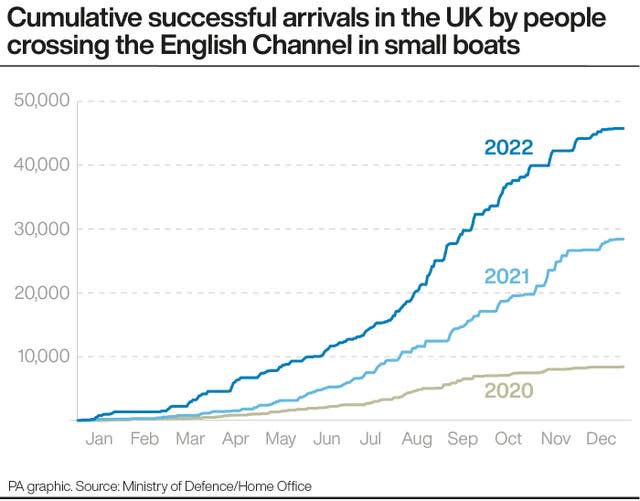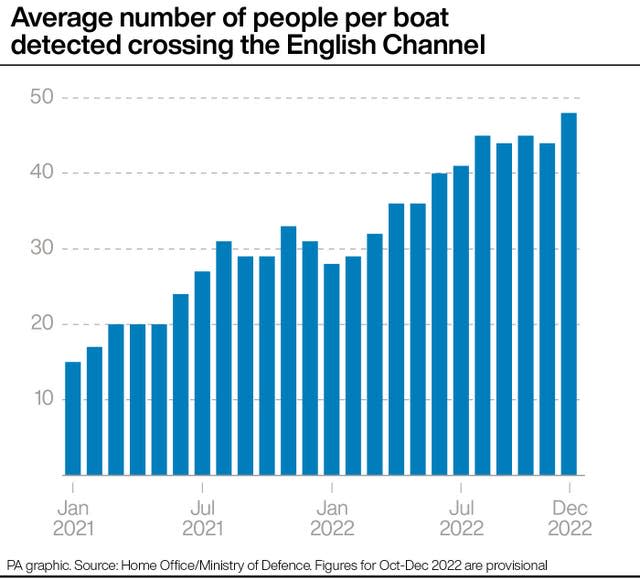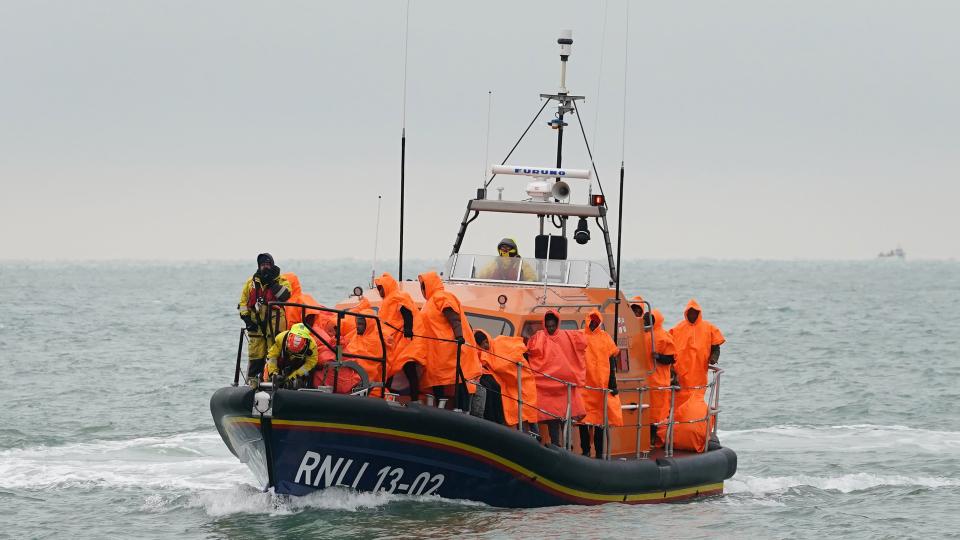Record number of migrants crossed Channel to UK in 2022
A record 45,756 migrants crossed the Channel to the UK in 2022, Government figures show.
The last crossings of the year took place on Christmas Day, when 90 people made the journey from France in two boats.
The Ministry of Defence (MoD) recorded no further crossings for the remaining six days of 2022 amid bad weather conditions.
The provisional annual total for 2022 is a record high and is 60% up on the 28,526 recorded for the whole of 2021, but it is lower than the 60,000 that Home Office officials previously estimated could make the journey during the year.
Over the last 12 months, politicians have made a series of attempts to get a grip on the migrant crisis as pressure intensified amid a tumultuous change in leadership which saw three prime ministers and three home secretaries.
Suella Braverman told of her “dream” of seeing the Government’s plan to send migrants to Rwanda succeed after she was appointed Home Secretary – a policy which High Court judges ruled is lawful but has so far been stalled by legal action.
Since the deal was signed in April by her predecessor Priti Patel, 40,460 migrants have arrived in the UK after crossing the Channel.
Prime Minister Rishi Sunak promised to bring in legislation in 2023 to make it “unambiguously clear that if you enter the UK illegally, you should not be able to remain here”.

Among a series of measures to curb Channel crossings and tackle the backlog of asylum claims, Mr Sunak vowed to stop housing asylum seekers in hotels, with the Government instead hunting for accommodation in empty holiday parks, former student halls and surplus military sites.
Ms Braverman confirmed plans to house migrants on disused cruise ships are also being considered as she revealed £3.5 billion would be spent on the asylum system in 2022/23. Some £2.3 billion of the total bill will go towards paying for hotels, she told MPs.
Earlier this week, former prime minister Theresa May warned that efforts to reform modern slavery laws risk creating other loopholes which could be exploited after Ms Braverman claimed they are being “abused by people gaming the system” to stay in the UK when they would otherwise face deportation.
For Labour, shadow home secretary Yvette Cooper said the record figures shows the Government’s attempts tackle the situation have made matters worse.
“Successive home secretaries have prioritised rhetoric and gimmicks over the hard work needed to tackle the problem,” she said.
“They’ve completely failed to tackle the criminal gangs and their new legislation has made things worse, with more lives being put at risk in dangerous boats and even longer asylum delays. ”
Meanwhile, ministers are also looking to curb the numbers of people coming into the country legally with plans which could reportedly target foreign students, make it harder to bring spouses to the UK, and increase the minimum salaries for companies employing skilled workers.

The number of migrants crossing the Channel has steadily increased since 299 people were detected in 2018. There were 1,843 crossings recorded in 2019 and 8,466 in 2020, according to the Home Office.
August last year was the highest month on record for crossings when 8,631 people arrived in the UK after making the journey. August 22 also saw a record 1,295 migrants crossing in a single day on 27 boats.
But the number of arrivals per month began to fall towards the end of 2022, which could reflect seasonal changes in the amount of crossings being attempted as a result of the weather.
In December 1,745 people made the journey – slightly fewer than the 1,770 arrivals recorded in the last month of 2021.
The MoD said its data is taken from “live operational systems” and is subject to change, “including reduction”.
A government spokesperson said: “The global migration crisis is causing an unprecedented strain on our asylum system.
“Nobody should put their lives at risk by taking dangerous and illegal journeys. We will go further to tackle the gangs driving this, using every tool at our disposal to deter illegal migration and disrupt the business model of people smugglers.”

 Yahoo News
Yahoo News 

